What Do Parents Want?
Insights from India & Religious Minorities in the UK
Parents invest heavily in their kids, expecting something back: financial support in old age, prestige to raise the family name, or growing the faith. But modern life brims with delicious temptations! As teens forge new friendships and explore the web, they’re vulnerable to ideological persuasion and deviation.
How do families secure their desired returns? Many cultures glorify filial piety as a sacred duty, instil religious devotion, and arrange marriages to align values.
But what happens when religious conservatives migrate to liberal economies? Parents now face an ‘honour-income trade-off’: protect cherished culture or urge their children to assimilate and chase materialism.
This essay explores the struggles of parenting in the modern age. Drawing on fantastic new studies as well as my own qualitative research across India and the UK, it presents a novel theory of cultural persistence and integration.
India: Caste and Control
“Parents are gods,” Garima beamed, welcoming me into her family home, where relatives shared meals, cracked jokes, and spent weekends together. Some lived upstairs - making it easy to rehearse our dance routine for her cousin’s wedding!
The bride, a 29-year-old pharmacy graduate with a successful career, had no desire to marry but bowed to her parents’s wishes. At the vibrant Punjabi wedding, relatives danced in jubilation, yet she barely glanced at her husband - a near stranger. Everyone saw this arranged marriage as perfectly normal.
In India, across all faiths, respecting elders is a core national value.
Filial Loyalty motivates Transfers to Parents
Natalie Bau, Gaurav Khanna, Corinne Low and Alessandra Voena have a brilliant paper, showing that when men migrate, parents secure a larger share of the dowry (cash or gifts from the bride’s family). Surveying 2,500 families across six Indian states and 550 male workers in Delhi, they find 27 and 45% of parents claim part of the dowry, especially when sons migrate and gain well-paid jobs.
Why? Migration creates a classic commitment problem: once sons physically relocate, parents face heightened uncertainty about future support. Geographic distance weakens enforcement mechanisms, while introducing new transaction costs for remittances. To overcome this friction, families develop a solution: securing a significant upfront transfer (from the dowry) before permitting migration! But such gifts are mediated by culture: sons are more likely to give the dowry to their parents if they value their parents’ approval.
Exploiting a natural experiment, they reveal that highway construction catalysed higher migration - most especially in areas that had dowries (i.e. institutions to tackle the commitment problems in migration). Families let sons move out if they’re getting an upfront return!
Let me add a special note of thanks: this paper helps us theorise how communities design institutions to tackle commitment problems! Now accepted at the Quarterly Journal of Economics! Bravissimo! Later in this essay, I’ll add my own edits. ;-)
This loyalty also shapes culture. Indian sons often live with parents, pool earnings, and embrace arranged marriages that consolidate caste networks. Interviewing a wide range of Indians, across six states and the diaspora, I have only met one man who left an arranged marriage - reflecting India’s ultra-low rates of divorces. “My father cannot even hear the word divorce”, remarked Sheba, who then stayed in abusive marriage, given the weight of parental opinion and caste bonds.
Religious Antagonism & Parental Policing
Indian parents not only seek their sons’ support in old age but also prioritise caste and religious continuity through marriage. Opposition to inter-caste and inter-religious unions remains widespread, with 65-67% of Indians saying it’s very important to stop men and women from marrying outside their faith.
BJP supporters and very religious groups express the strongest opposition to inter-religious marriage. They also tend to live and befriend fellow believers. In the BJP’s Central Indian heartland, 82% of Hindus prioritise halting inter-religious marriage.
Religious antagonism is not static, it is exacerbated by both religiosity and perceived threats. These tensions have been exacerbated by Hindu nationalism, fueled by Ramayana TV serials, H-Pop music, “love-jihad” allegations, and BJP campaigns stoking anxieties about Muslim population growth. Shruti Rajagopalan further argues that Indians have always guarded their communities, but modernity, urbanisation and mass education heighten anxieties as young people mingle with outsiders, prompting stricter policing.
From my own interviews, many young women had been permitted to study or work afar, but their parents arranged single-sex accommodation with 6pm curfews.
Comic Subversion & Community Backlash
As Indian parents tighten control to preserve religious against modern influences, a new challenge emerges: comedy. This isn’t just little jokes, it’s deeply threatening! Indians may cease to revere parental edicts if they are openly mocked as absurd. This has triggered organised backlash, demanding government crackdowns. As Veenu Venagopal explains:
“With every instance of outrage, the government seeks to tighten laws around what can and cannot be said… The Supreme Court urged the government to consider regulating “obscene” content on YouTube”
Communal Riots & Tightened Policing
Over the past 50 years, Indian Muslims have experienced two distinct shocks: Saudi-funded Wahhabism and Hindu nationalistic persecution. Strict religiosity has been intensified, alongside increased threats.
After communal riots, Muslim women reportedly experience heightened surveillance, stricter dress codes, and earlier curfews.
“The men decided that they did not want their women to go out because it meant crossing the other community’s areas, so the world of the women just shrank.” – Noorjehan Safia Niaz (activist).
“We find that after the riots, many more parents do not want to send their children to school outside the area.” – Shehnaz Shaikh (school principal).
Under siege, Muslim communities tightened restrictions on women’s mobility and economic autonomy. This constrains women’s capacity to explore, build diverse friendships, and critique unfairness. Muslim women are sometimes reluctant to speak out, lest their words be weaponised by the Hindu right.
Drawing all these insights together - on subversive comedy, opposition to inter-religious marriage, and parental policing - let me reiterate my central point:
Strong communal ideology combined with perceived threats motivate strict policing and lobbying, to ensure these values persist in future generations.

Does Economic Development Catalyse Cultural Change?
Modernisation theorists wager that wealth washes away religious conservatism, ushering in secular liberalism. But as I interview people from across the world and learn about their lives, I realise that cultural change isn’t just about money, but ideological persuasion and prestige!
Centuries ago, when our ancestors were illiterate peasants, lived among kin, and rarely left their villages, established authorities often faced little competition. As Zambia’s Bemba say: “umwana ashenda atasha nina ukunaya” - the child who doesn’t travel praises their mother’s cooking”. Backwards technology meant that even if one person had subversive ideas, these could hardly gain popular momentum. The Hussites (an earlier precursor to the Protestant Reformation) failed to mobilise the masses, and this may be partly due to the absence of printing.
By the late 20th century, cities bloomed, schools opened and communications technology let youths create their own spaces. Hugo Ribadeau Dumas (2025) finds that in India’s cities, female friends can linger in cafes, message unsupervised, and support each other’s dreams. University and large corporations provide particular freedoms, and it was in these spaces where I met more independent women, supporting each other’s visions of themselves as individuals.
From a globally comparative perspective, youthful rebellion really got rocking in countries with weak kinship, democratic freedoms and economic growth. Bob Dylan’s “Times they are a changing” challenged parental dogmatism and championed youth-led resistance:
“Come mothers and fathers
Throughout the land
And don't criticize
What you can't understand
Your sons and your daughters
Are beyond your command
Your old road is rapidly agin'
Please get out of the new one
If you can't lend your hand
For the times they are a-changin’”.
The era pulsed with defiance: France Gall urged us to “Resist, Prove that you exist, Look for your happiness everywhere, go”. Bowie’s “Rebel Rebel” cheered non-conformity, Pink Floyd’s “Another Brick in the Wall: Part 2” and Twisted Sister’s “We’re Not Gonna Take It”spurned control, while Madonna’s “Papa Don’t Preach” valorised personal choice. In Brazil, Caetano Veloso declared “É Proibido proibir” (it is forbidden to forbid).
Across Turkey and Taiwan, arranged marriages came tumbling down, while this practice persists in South Asia, given the importance of caste.
Faith amid Liberal Threats
Migrating to advanced economies boosts earnings and welfare, but creates new challenges. For devout believers, the West’s liberalism presents threats: children may become morally corrupt, lose their belief in God, and possibly go to Hell.
To keep them on the righteous path, parents may enrol kids in faith schools and emphasise the importance of marrying within the faith, so as to expand the religious community. This can also have economic returns: devout wives recognise sons’ obligations to their parents, so may accept him transferring money back to his folk. So what does the empirical literature say?
Bisin, Verdier, Patacchini and Zenou (2008) ask if Islamophobic discrimination and harassment mean that Muslims integrate differently from groups like Caribbeans or Chinese. Harnessing a 1993/94 survey on religion, inter-marriage, and school choices, they find that Muslims were more inclined to prize faith and shun inter-faith unions. Muslim parents may also orchestrate arranged marriages to ensure a spouse shares the same faith. Caution: their sample was quite small, so these results are only suggestive.
The superb Shadi Farahzadi (2024), analyses the 2011 UK Census, and finds that over half of British Muslims marry someone from their ancestral country of origin. Almost 60% of British Bangladeshis marry someone from Bangladesh. In fact, British Muslim women are TEN times more likely to marry someone from overseas than to marry someone from another religion.
Among Bradford’s Pakistani mothers, almost half wed relatives. In 2023, Muslims were also more inclined to identify with a religious community.
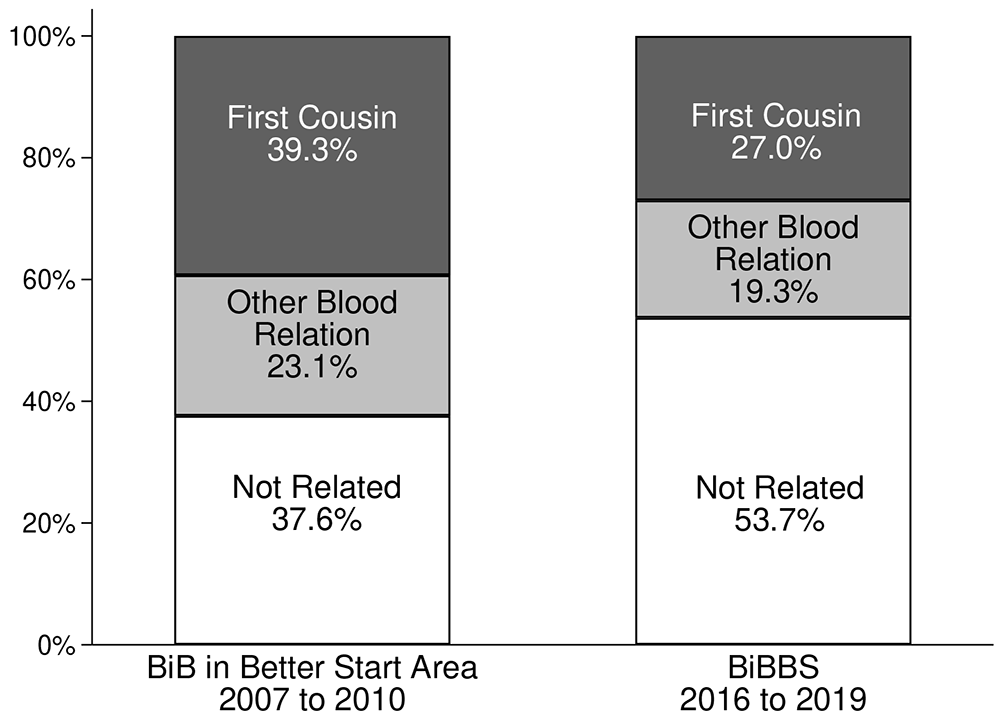
Parents Raise Children to be Religious
Confronted by secular threats, parents may seek religious safeguards, and the invisible hand provides! On Birmingham’s Coventry Road and East London’s Green Street, Islamic bookshops stock hundreds of akhlaq (ethical)guides, teaching kids that life’s purpose is reaching jannah (paradise). Google Maps shows myriad faith schools, offering classes after-school or full-time. On YouTube, Instagram, and TikTok, anyone can learn from respected religious authorities.
Sajid (from Sri Lanka, working in finance) took all four children to faith schools at evenings and weekends, while also sharing content from the web:
“When I came 25 years ago, all there was was western television. Now there are so many videos and channels… You can really build your faith. So there’s definitely more opportunity now!”
Marriage introduces an Intergenerational Commitment Problem
Marriage poses a unique challenge for religious families seeking to preserve their faith across generations. Drawing on Bau et al’s (2025) framework of commitment, we see that parents invest heavily in their children’s upbringing, expecting returns like cultural continuity and eternal salvation. However, ensuring grandchildren inherit these values hinges on an unknown intermediary: the spouse.
Two risks threaten this goal. Daughters may embrace Western liberalism, neglecting to instil proper values in their children. Meanwhile, sons may fall head over heels and prioritise their wife’s preferences over religious obligations, risking their path to paradise. In these cases, they will not enter paradise. For devout families, these choices reflect a quest to maximise utility over eternity.
This dilemma ties directly to what I call ‘the honour-income trade-off’, where families balance cultural preservation against economic assimilation. My extensive qualitative research and analysis of the wider literature suggests that this trade-off shapes three strategies:
Safeguard Honour: Parents may enforce arranged marriages, faith-based education, or female seclusion. This preserves religious continuity but can limit economic mobility - if families rely on a sole male breadwinner, they are much more vulnerable to economic shocks and poverty traps.
Chase Income: Families may encourage assimilation, urging children to embrace secular education and professional careers. This can boost earnings and upward mobility, but risks cultural dilution if children marry outside the faith or adopt liberal values.
Blend Both: Some families navigate both goals. They may permit daughters to work but impose curfews or faith-based education, ensuring economic gains while keeping (and signalling) core values.
To preserve the faith, Sajid has helped his sons marry women who credibly signal religious commitment.
Have you heard of [this religious scholar]? Google him! Click on his YouTube channel right now! He’s a very wise man and his daughter is actually married to my son…
My other son is a doctor. But sometimes women doctors are sometimes focused on their career.. We wanted someone who also understood the family…
Fatima had been to a faith school for 8 years while doing med school, so she understood the faith very well. She said, “I don't need to work”. And we told her, “Your income is your income, if you want to work part time, fine. But my son is a doctor, we want you to look after the children” and she completely agreed with that and understood that because she had been to [a faith school]”.
We have got to grow the ummah, and we are growing the ummah”.
So just as migration creates a geographical commitment problem in India so too does marriage create anxieties about intergenerational piety. In both cases, parents must act strategically so as to ensure desired returns even when direct monitoring becomes impossible. Sometimes, this involves harsh threats of ostracism for disobedience.
Are Young People becoming more Independent?
In my interviews across Blackburn, Birmingham, Upminster, Whitechapel, Southhall, and Luton, British Muslims tell me that the younger generation is much more independent, mingling at college and WhatsApp, increasingly choosing their own partners. So long as they’re Muslim, love can blossom!
“When I was 19, my [Pakistani] father arranged my marriage to his childhood friend. I was extremely upset and worried he’d have girlfriends and leave me… My father insisted that the friend was good, and the son would also be good. So, I agreed, with no meeting… But [here in Luton] my children say they’ll marry their own choice. I tease them, but it’s fine with me as long as they’re Muslim, any Muslim” - Sara, 50, migrated at 20 for marriage.
“When I was young, we’d never talk back to elders, even if they were rude. But now young people speak up. Now, there’s a lack of respect” - Fatima, 55, her family was from Kashmir, born in Britain, runs a stall selling Asian dresses.
“In the past, parents arranged rishtas [arranged marriages]. But now, young women want ‘love marriages’, finding men for themselves!” - Meryam, 46, British-born, cashier.
Hasan (Libyan) and Zoya (Pakistani) met at university, courting secretly via texts and letters. Years later, their families approved, unconcerned by ethnicity since both were Muslim. Yet Hasan, eager to emulate the Prophet, insisted on loose clothing for Zoya as well as a gender-segregated wedding.
But even as young people spread their wings, parents are cautious. In Birmingham, Zayan has just accepted at a London university. Her parents may move to support her studies,
“because Islamically, an unmarried woman should only live with mahram” (family).
What if Migrants are Alone?
If families anchor cultural continuity, young people may enjoy greater freedoms when they migrate independently - as students or professionals. This precisely echoes Bau’s finding on migration and dowries, there’s a commitment problem! As a young Bangladeshi woman in the US explained,
“Bangladesh currently is not able to participate in DV lottery because US thinks it has enough Bangladeshi people to keep the desired level of diversity mix. So current migration pattern is international students who are arriving independently or silicon valley engineers other than family chain migration.
When we arrive in college level we just immediately start making friends, go to parties, start dating. It becomes more statistically likely that our partners are not from Bangladeshi Muslim backgrounds…
From my personal experience I find that young Muslim immigrant both men and women who come along as international student or with an early career job tend to be less strictly practicing than their first gen peers.
I have Pakistani American female friends who are more conservative in their lifestyle than myself or other young immigrants of similar upbringing I know of… I recently met a first gen Bangladeshi man in the US who was blown away by how ‘chill’ I was. He was surprised that his family in the US seemed more conservative than my family in Bangladesh…
I think partly it’s because my family is not able to help me in many things being so far. Due to lack of access to my private [life] and their inability to even support me at many occasions I just have a type of autonomy that first gen Muslim women don’t have.
A male cousin of mine was complaining that his parents are forcing him to get an arrange marriage. I just said “why don’t you just move out and go to another state! You are an American”. But he was just scared that he needs that community support”.
I heard precisely the same when interviewing lone Muslim men in Silicon Valley! Without family or community policing, they increasingly hung out with women and became more secular:
“Sometimes I feel I am more close to Americas or Europeans than some of my relatives” -Turkish software engineer.
Now, if you’ll forgive me, I’ve illustrated this with a very simple flowchart. Thanks be to Claude.
Guarding Faith Against Threats
Parents pour their hearts into raising children - hoping for financial support, prestigious careers, or a growing religious community. Yet when pious believers migrate to advanced economies, they face a tough challenge. The siren’s call of liberalism is extremely tempting and may lure their children away.
I suggest that when faith is imperative yet feels threatened, families may tighten their grip through religious instruction, curfews, gender segregation and arranged marriages. Unlike studies pointing to discrimination, I suggest these are deliberate choices to prioritise honour over income, fortifying caste or ummah. But this comes with economic downsides: single-earner households may get trapped in poverty. Europe’s welfare state may inadvertently reduce the cost of this trade-off, resulting in women facing strict constraints.
The big question is how to foster family support for liberal freedoms, so that everyone can thrive. As fertility collapses, advanced economies need migrants, who can also benefit immensely from wage gains! Beyond soundbites and speculations, we need careful empirical research to ensure that well-intentioned interventions don’t actually backfire.
Tangent: I’ve just been invited to the World Economic Forum in Tianjin, very excited, please shout if you’d like to meet! :-)



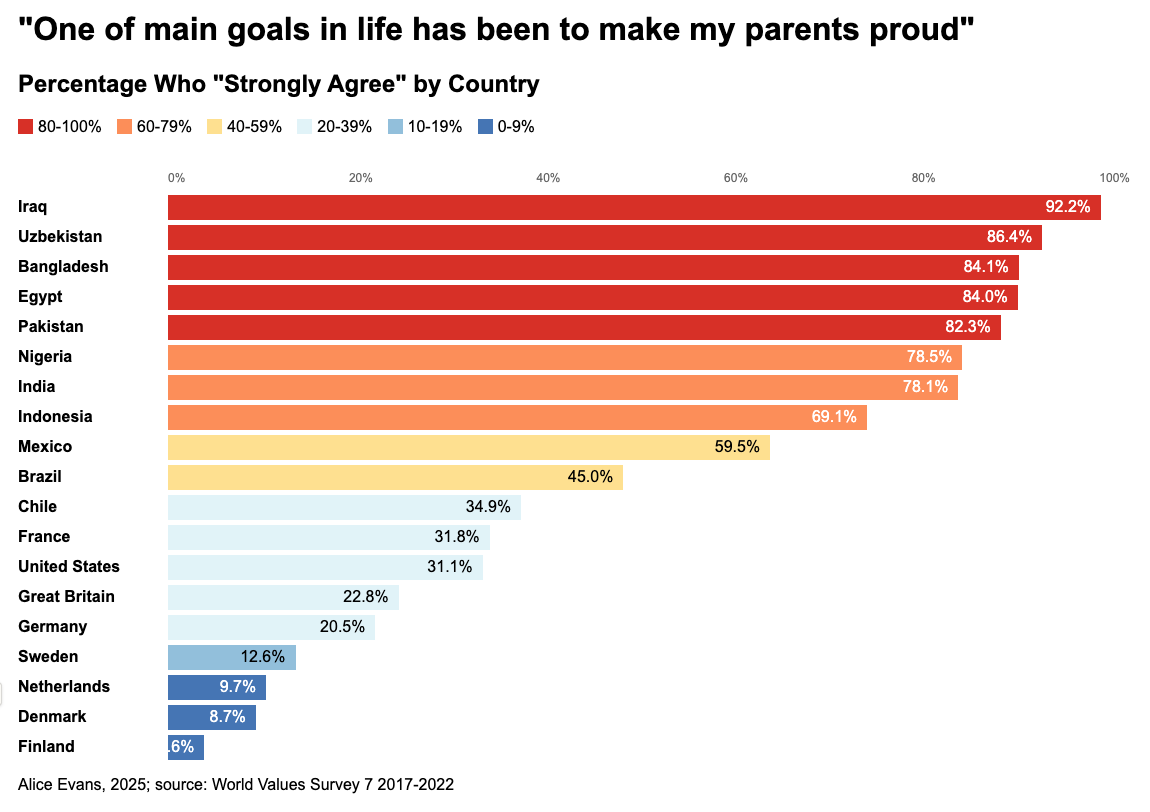
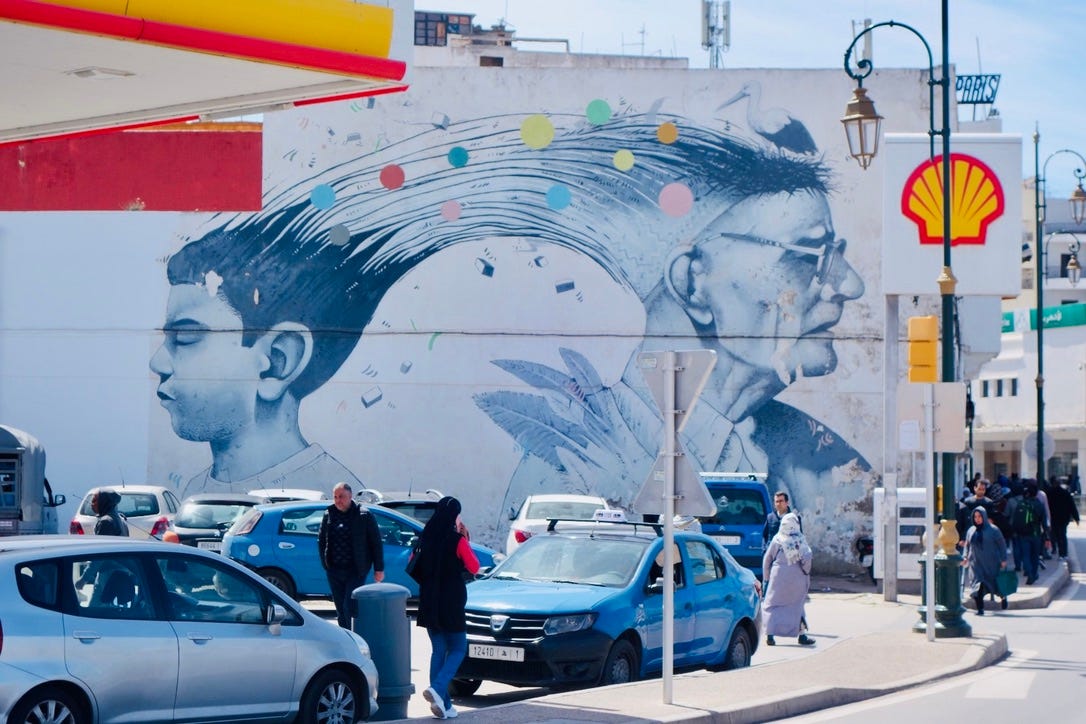







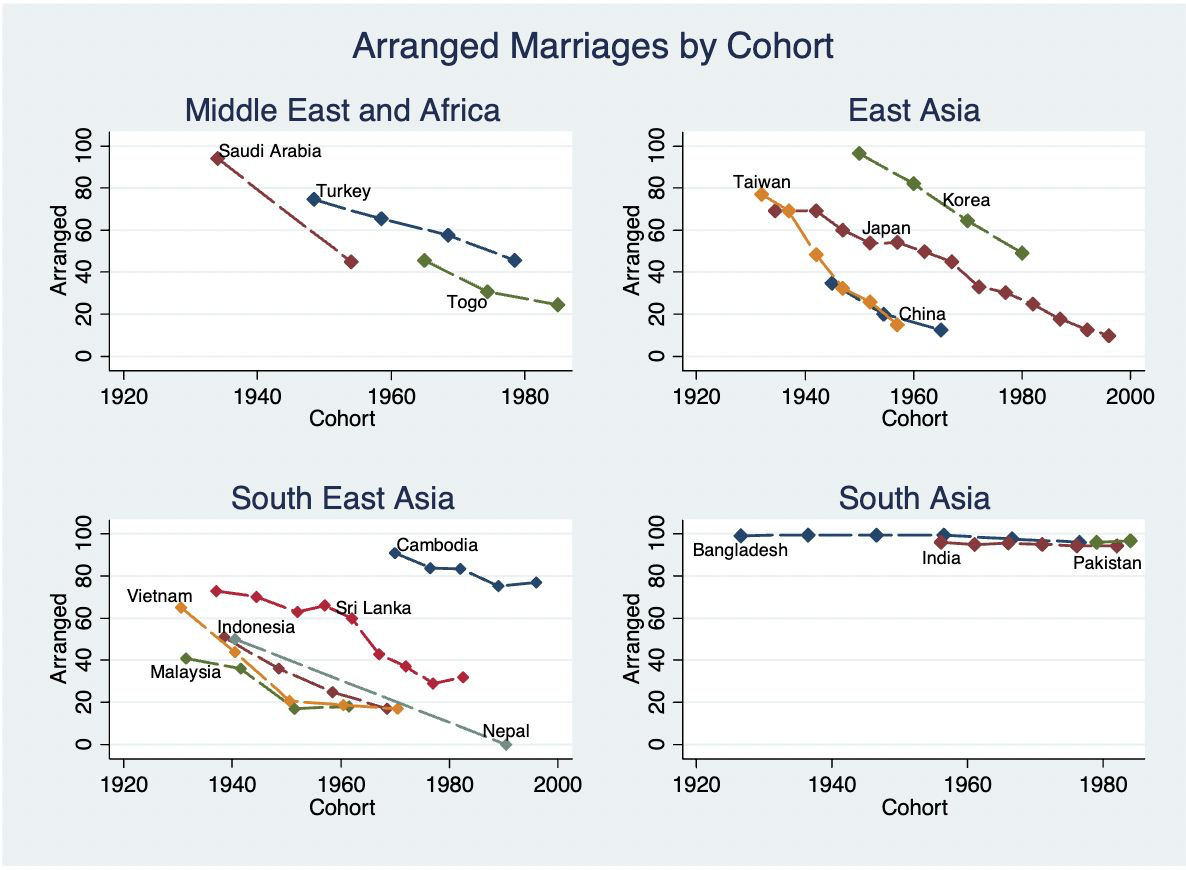

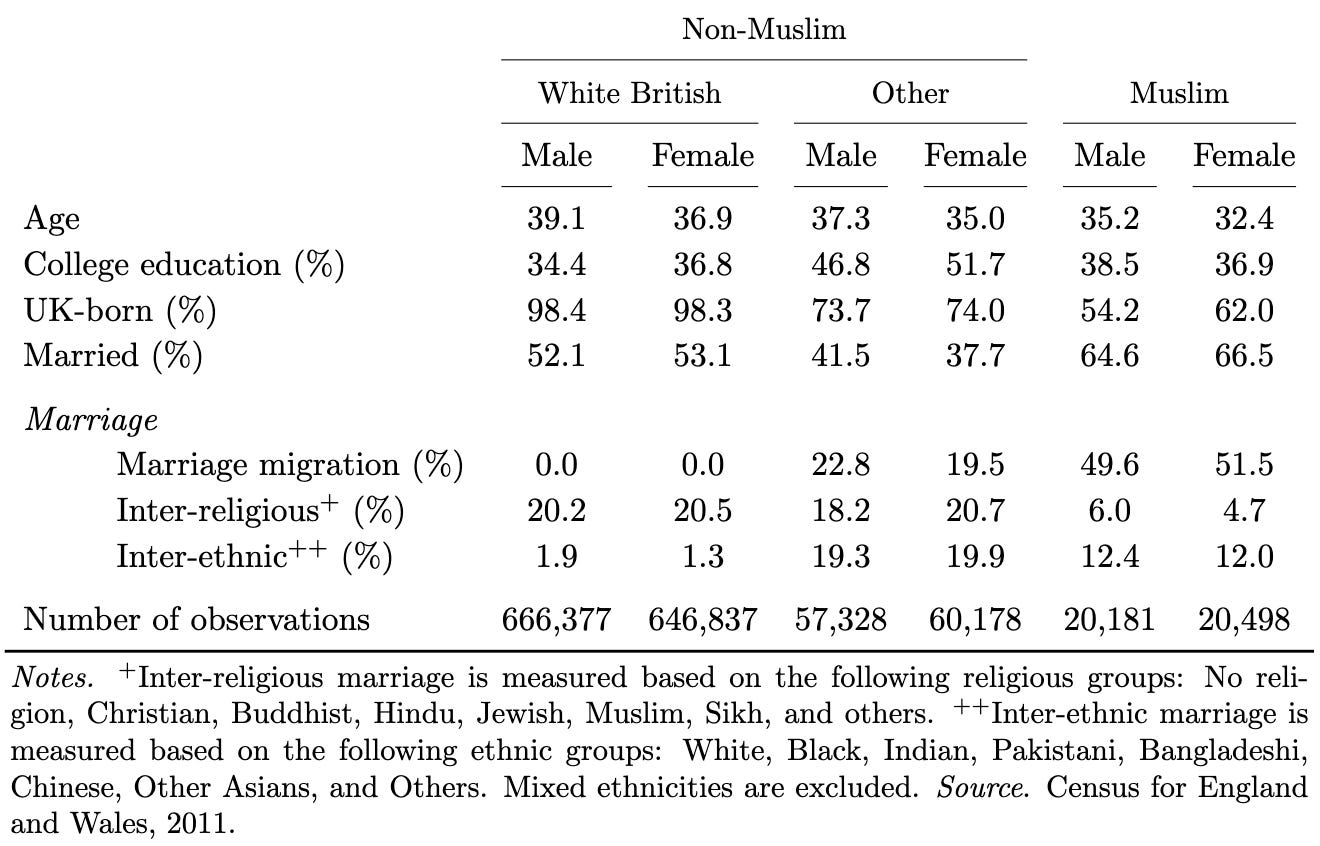










The notion that economic growth will lead to the liberalization of Muslim communities has not materialized as some might have expected. You mentioned how British Muslims traditionally married within their extended kin network or with individuals from their country of origin, and later began marrying other Muslims. While this shift might appear to be a form of cultural liberalization on the surface, it may not be the case. Instead, it could reflect the increasing influence of Islamist ideology, which differs from cultural conservatism by undermining local and national identities in favor of emphasizing the ummah, or global Muslim community.
In my understanding of the world, Islamism can be likened to the Muslim world's equivalent of acquiring a Lamborghini. The poor may view it as impractical or unattainable, and those with old money might consider it cringe-worthy or low status. However, the emerging middle class often holds Islamism in high regard, seeing it as a symbol of status and identity.
I think people often misunderstand the causality when they argue that economic growth leads to cultural liberalization. As you mentioned, there is an honor-income trade-off, which suggests that cultural liberalization might actually be a precursor to economic growth.
Claiming that economic growth causes cultural liberalization is akin to arguing that economic growth leads to deregulation. This perspective overlooks the potential for cultural shifts to drive economic changes, rather than the other way around.